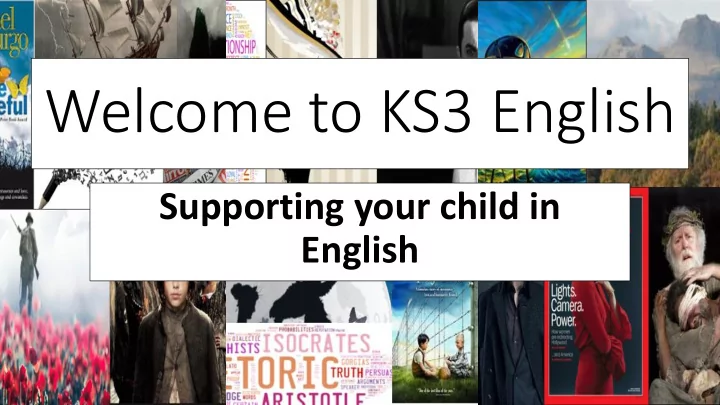

Welcome to KS3 English Supporting your child in English
The Key Stage 3 English Curriculum • The Key Stage 3 curriculum is currently being reviewed. Included on the following slides is an outline of what your child will be learning in each academic year, although the order of the units may change. • The curriculum has been designed to support your child on the journey from Year 7 to the end of Year 11. Each unit is focussed on developing the key knowledge and skills required in the English Language and Literature GCSEs. • In addition to these units all students will be expected to engage in a range of wider reading, both in class and at home. In Years 7 and 8 this includes a fortnightly lesson in which they will have time to access the library. Reading well is fundamental to your child’s success in all of their subjects
Novel – Pri rivate Peaceful Autumn 1 Responding to texts analytically and exploring the context of the novel. In Intr troduction to to Poe oetry Autumn 2 Exploration of different forms of poetry including dramatic monologues, ballads and sonnets. Newspapers Spring 1 Exploration of the main features of journalistic writing including a Non-Fiction writing unit. Shakespeare’s The Tempest Spring 2 Introduction to the life of Shakespeare and his plays including reading The Tempest. th Century Nove 19 19 th vel – Oli liver Twis ist Summer 1 Exploring how Dickens’ creates his characters and life in 19 th century London . Play lay – Hound of th the Baskervilles Summer 2 Introduction to the conventions of a play.
Novel – Boy in in th the Striped Pyja jamas Autumn 1 Exploration of writing about the Holocaust. . Non Fic iction Rhe hetoric ic Autumn 2 Exploration of the use of rhetorical devices in non-fiction media. th Century Novel 19 19 th l – Dracula Spring 1 Introduction to the Gothic Horror genre. Shakespeare’s Midsummer Night’s Dream Spring 2 Exploring the attitudes to magic and fairies in both Shakespeare’s time and the contemporary world. Rela lationships Poe oetry Summer Exploring how poets write about relationship through poetry including an 1 introduction to Romanticism. Pla lay – Pygmalion Summer Exploring the conventions of a play and how myths influenced the play 2 wright.
Novel – War r of of the the Worlds Autumn Introduction to dystopian fiction: understanding how to approach a challenging 1 text. . Non on-Fiction Media Autumn 2 Exploring the conventions of a range of non-fiction texts. People an and Pla Place Poetry Developing a critical response to a range of poems clustered around the Spring 1 theme of people and places. Shakespeare’s King Lear Spring 2 Introducing the tragedy genre focussing a the creation of a flawed hero. Creative Wri riting – Power and Con onflict Summer Using a selection of GCSE Power and Conflict poems as a stimulus for creative writing . 1 Murder r Mys yste tery – Sh Sherlo lock Holm olmes and An An In Insp specto tor Call lls Summer Exploring the conventions of the murder mystery genre and reading the GCSE 2 set play.
How to Support your Child in the Classroom: Read to Succeed Every day your child is encouraged to read a book of their own choice for 15 minutes.. Please ensure that your child has a reading book with them that they are keen to read and that is of an appropriate level. If you are not sure of the level that your child should be reading at, the library staff can advise. Every child has access to the school library where they can find a wide range of books that they can borrow.
We do Accelerated Reader in Y7 and Y8 • Students are tested to establish their reading ages at the beginning and end of the year. • We encourage reading for pleasure. • Students complete quizzes on the books they have read and receive rewards for doing so. • Rewards ✓ Based on words read… ✓ Quizzes completed… ✓ Reading Millionaires!
What happens in your child’s English lesson? Peer Reading Independent Assessment learning Speaking and Writing Listening Silent work Discussion
Our Expectations in English ✓ We expect your child to take part and we will support them to do this. ✓ We expect your child to write as neatly as they can. ✓ We expect your child to respond positively to feedback. ✓ We expect your child to try their best. ✓ We expect your child to ask questions if they are unsure. ✓ Please contact us, if you have any concerns
How we help your child to make progress: Green highlighting shows the most successful parts of the work. The orange highlighting means the I will positively welcome R4 spelling, punctuation or grammar is challenge so I can develop my incorrect and needs revisiting. potential to the full.
Homework – supporting your child at home TIPS! ✓ Create a quiet space for homework to take place. ✓ Discuss your child’s work with them. ✓ Use Class Charts ✓ Create reading time at home with your child. 3-4pm: The library is available every day to support your child.
Any ✓ Contact your child’s English teacher directly from the website. ✓ Contact KS3 Curriculum Lead: questions? kward@theregisschool.co.uk ✓ Contact Head of English sgallant@theregisschool.co.uk Supporting your child in English
Recommend
More recommend